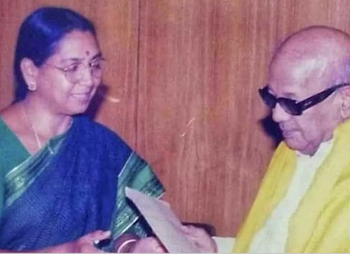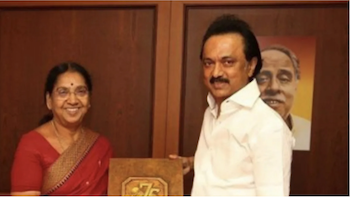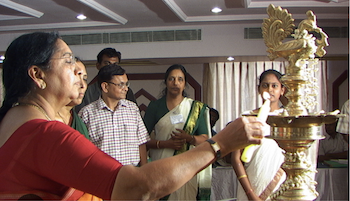
Born on June 23rd, 1947, Subbulakshmi Jagadeesan is described by many as a woman who played an extremely pivotal role in early Indian politics. She grew up in the Erode (one of the 38 districts in Tamil Nadu) at the tail-end of India’s struggle for independence from the British Empire.
Jagadeesan completed high school at the SSV School, which was located in her hometown. At the time she attended, the SSV School was the only place of secondary education available for forty miles. She then obtained a Bachelor of Science at Seethalakshmi Ramaswamy College, in Tiruchirapalli, another district located in Jagadeesan’s home state of Tamil Nadu. The institution was meant specifically to provide postsecondary education for women.
Following her postsecondary education, Jagadeesan began working as a schoolteacher. However, she soon had a change of heart. In 1978, she began her political career in a state-level position when she encountered a chief minister trying to recruit graduate women to the political sphere. “That is how an ordinary school teacher like me joined politics,” she explained.
In Tamil Nadu, the textile industry occupied a very unique position. It was responsible for a relatively large portion of the state’s employment and exports and provided large-scale employment for rural residents after farming. As the Minister for Handloom Textiles of the government of Tamil Nadu, Jagadeesan’s duty was to promote the socioeconomic conditions of her state’s handloom workers. Working for economic welfare would soon prove to be one of the defining factors of her economic career.

In 1989, her role in government expanded when she became the state of Tamil Nadu’s Minister for Social Welfare. As a part of this ministry, Jagadeesan’s role became even more imperative to the function of her state. At this point, she was not only responsible for the advancement of handloom workers but also for the welfare and empowerment of all marginalized groups—including, but not limited to, disabled people, scheduled castes, and members of the LGBTQ+ community.
Considering the year she took this position, it was no easy task. Nonetheless, she made a substantial difference in the lives of many communities in Tamil Nadu and the effects of her work are still reflected in the state today.
Between 2000 and 2002, Jagadeesan took a massive blow to her political career and personal life. Padmanabha, the leader of a Sri Lankan-based militant group, had been murdered, and authorities connected Jagadeesan to it through a lengthy investigation. Eventually, she was charged with being a “sympathizer” to this group and providing them with supplies and other amenities. She vehemently denied these charges as “politically motivated.” Ultimately, she appealed her case to the Indian Supreme Court and was completely discharged from the case. Jagadeesan may have been cleared of all charges in the end, but the damage had already been done. These events were a stain on her career that would be difficult to wash away.

The politician continued to work her way up the Indian government, eventually getting elected into the Indian Parliament in 2004 as a member of Lok Sabha—one of two houses in India’s bicameral Parliament. Commonly known as the House of the People, members of Lok Sabha are elected by adult universal suffrage. Because of this giant stride in her career, Jagadeesan had started to gain quite a bit more media attention. During this time, she was not active in electoral politics but served as her party’s Deputy General Secretary. Using whatever extra time she had, Jagadeesan highlighted that she was one of 10 women in an 81-member committee. She was very vocal about her belief that spaces in Parliament needed to be reserved for women—especially those who are members of the Dalit or Adivasi castes—and prompted others in higher positions of power to try to rectify this issue. Today, a much higher number of women from these groups can be seen in Parliament, largely thanks to the work of Jagadeesan and those she persuaded to take action.
After decades spent in Indian politics and nonstop work put into advancing marginalized groups around India, Subbulakshmi Jagadeesan handed in her resignation as the party president in August of 2022. In a statement about a month later, she announced that her intention was not to join a different party but to retire from politics altogether, as her time in government had ended. Her successor in Parliament today is C. Manickam.
Today, Jagadeesan is 76 years old and resides in her home district of Erode with her spouse, A.B. Manickam, with whom she has one son named Jayaprakash Jagadeesan.
Most importantly, through her work as a female politician in India, she raised awareness of the appalling gender disparity in Parliament. Jagadeesan broke the very thick glass ceiling for female politicians in India and opened the door for subsequent women in Indian politics to continue the work that she had started.
Why Did I Choose to Research Subbulakshmi Jagadeesan?
Growing up South Indian, I have been very interested in how women’s roles in Indian politics have evolved and changed. I wanted to learn more about someone who facilitated this change, and Jagadeesan’s life and career were a shining example. Learning about her journey and her impact on Parliament made me happy to see that things in India are no longer the same as they once were because of her. Understanding how the political unrest in Jagadeesan’s time affected the career of a woman like herself was also a very enriching experience. Understanding her contributions on a deeper level has given me a much bigger sense of pride in my South Indian heritage.
Works Cited
Ani. (2022, September 20). DMK deputy general secretary Subbulakshmi Jagadeesan quits politics. ThePrint. https://theprint.in/politics/dmk-deputy-general-secretary-subbulakshmi-jagadeesan-quits-politics/1135590/
G Babu Jayakumar & D Sekar. (2022, September 20). DMK deputy general secretary Subbulakhsmi quits, causes a flutter. Deccan Chronicle. https://www.deccanchronicle.com/nation/politics/200922/dmk-deputy-general-secretary-subbulakhsmi-quits-causes-a-flutter.html?infinitescroll=1
Centre, N. I. (1996, August 14). List of members. Digital Sansad. https://sansad.in/ls/members
Rao, B., 15, M., 5, M., 29, M., CounterView - April 4, CounterView, Astha Savyasachi - April 3, Astha Savyasachi, sabrangindia - April 2, Sabrangindia, sabrangindia - April 4, sabrangindia - April 3, Jay Patel - April 2, Jay Patel, CJP Team - April 4, & CJP Team. (2018, June 30). Why 277,160 women leaders remain invisible to Tamil Nadu’s political parties. SabrangIndia. https://sabrangindia.in/why-277160-women-leaders-remain-invisible-tamil-nadus-political-parties/
Venkatesh, M. r. (2018, July 9). In hotseat, after brush with Tada. Telegraph India. https://www.telegraphindia.com/india/in-hotseat-after-brush-with-tada/cid/745288
Wikimedia Foundation. (2024, February 21). Subbulakshmi Jagadeesan. Wikipedia. https://en.wikipedia.org/wiki/Subbulakshmi_Jagadeesan
This article was published on 6/8/24